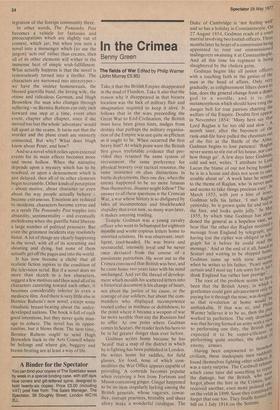In the Crimea
Benny Green
The fields of War Edited by Philip Warner (John Murray £5.95)
Takeit that the British Empire disappeared in the mud of Flanders. Take it also that the reason why it disappeared in that bizarre location was the lack of military flair and imagination required to keep it alive. It follows that in the wars preceeding the Great War to End Civilisation, the British must have been given hints, nudges from destiny that perhaps the Military organisation of the Empire was not quite as efficient as it ought to be. When occurred the first heavy hint? At which point were the British first given irrefutable ,evidence that provided they retained the same system of recruitment, the same preference for physical bravery over tactical resource, the same insistence on class distinctions in battle deployments, then one day, when the enemy happened to be no more fatuous than themselves, disaster might follow? The answer to all these questions is the Crimean War, a war whose history is so disfigured by tales of incompetence and blockheaded stupidity that even now, so many wars later, it makes amazing reading.
Temple Godman was a young cavalry officer who went to Sebastopol for eighteen months and wrote copious letters home to assorted relations. He was observant, intelligent, cool-headed. He was brave and resourceful, intensely loyal and he never once deviated from the course of a passionate patriotism. He went out to the Crimea convinced that British was best, and he came home two years later with his mind unchanged. And yet the thread of development which moulds his scattered letters into a historical document is his change of heart, not about the justice of his cause, or the courage of our soldiers, but about the commanders who displayed incompetence rooted either in madness or doltishness, to the point where it became a weapon of war far more terrible than any the Russians had to offer. At one point where Godman comes to Scutari, the reader feels his hero to be in far greater danger than ever before.
Godman writes home because he has 'heard' that a map of the district in which he is fighting has been published in London. He writes home for saddles, for field glasses, for food, none of which commodities the War Office appears capable of providing. A comrade becomes popular when receiving a box from Fortnum and Mason containing ginger. Ginger happened to be an item singularly lacking among the British generals, whose vagaries, cowardice, corrupt practices, brutality and sheer idiocy make a wonderful catalogue. The
Duke of Cambridge is 'not feeling well' and so has a holiday in Constantinople. On 27 August 1854, Godman reads of a court martial involving two loutish officers. Three months later he hears of a commission being appointed to root out commissioned malingerers swanning it at Constantinople. And all this time his regiment is being slaughtered by the cholera germ. Godman begins like all junior officers with a touching faith in the genius of the man at the head of affairs. Only very gradually, as enlightenment filters down t° him, does the general change from a deniigod to a noodle, and it is this metamorphosis which should have rung the danger bell for true patriots charting the welfare of the Empire. Doubts first apPear in November 1854: 'Many here say that Lord Raglan is far too old and slow A month later, after. the bayonets of the rank-and-file have pulled the chestnuts out of the fire at the Battle of the Alma' Godman begins to lose patience; 'Raglan never seems to stir out of his house, nor care how things go'. A few days later Godmal"; cold and wet, writes, 'I attribute to 1-01.,' Lucan the blame of our not being housea, he is in a house and does not seem to take (rouble about us'. A week later he retail's to the theme of Raglan, who 'is never sect) and seems to take things precious easy'. 111 March 1855, with just a hint of irony, Godman tells his father, met Ragta„,11 yesterday, he is grown quite fat and red"' the face, and looks quite jolly.' In IVlaY 1855, by which time Godman has aban" doned the general as a hopeless case, hear that 'the other day Raglan received da message from England by telegraph, ar having lost the cipher was obliged to tete: graph for it before he could read 01; message.' And at the end of it all, based 3' Scutari and waiting to be shipped hotrie,; Godman sums up with terse accurac/s when he writes to his father, 'Peace seetni certain and I must say I am sorry for it, fcir think England has rather lost prestige ' ,e The root of the problem seems to ha'a been that the British Army, in whichbv gentleman could gain advancement onlY paying for it through the nose, was desigtloo so that revolution at home would lip unthinkable. If that was so, and P1110 Warner believes it to be so, then the P worked to perfection. The only draw lha.0 was that having formed an army with a 'en to performing one duty, the British t" io expected it to be super-efficient of performing quite .another, the defeat
enemy armies.
. Having been empowered to br° roy civilians, those inadequate men sudcles found themselves fighting other soldierf._, was a nasty surprise. The Cardwell refo at; which came later did something to re13000 the damage, but the British, wit° slater forgot ,about the hint in the Crimea. _oe, received another, even more pointediv vA to
e, '-' the on the veldt in 1899. Soon they contr on the veldt in 1899. Soon they contr forget that one too. They finally foote° bill on 1 July 1916 on the Somme•


































 Previous page
Previous page